Honorary Geographer
Deadline: September 30, 2026 (by midnight EST)
Every year the AAG designates an individual as that year’s AAG Honorary Geographer as a way of recognizing excellence in research, teaching, or writing on geographic topics by non-geographers.
Nominations should include the complete name and address of the nominee and a concise (500 words maximum) yet specific description of the accomplishments that warrant the nominee’s selection as an Honorary Geographer. Biographical and bibliographical information not included in the statement should not exceed six additional pages of text.
As with all other AAG awards, eligibility also rests on the candidate being in compliance with the AAG Professional Conduct Policy. Nominations may be rescinded, and the award may also be revoked for any candidate or awardee who is found in violation of the AAG’s Professional Conduct Policy.
Nominations
Nominations should be submitted by the deadline by completing the online application form.
AAG Honorary Geographer Recipients
Mauris non tempor quam, et lacinia sapien. Mauris accumsan eros eget libero posuere vulputate. Etiam elit elit, elementum sed varius at, adipiscing vitae est. Sed nec felis pellentesque, lacinia dui sed, ultricies sapien. Pellentesque orci lectus, consectetur vel posuere.
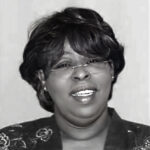
Gwendolyn C. Warren
She is recognized for her lifelong excellence in applying spatial thinking to the challenge of creating better lives and opportunities for people, starting in Detroit in the late 1960s.
At the age of 18, Warren was already a dedicated community activist when she became the co-director of the Detroit Geographical Expedition and Institute (DGEI). Founded in Detroit in 1968, DEIG was a radical geography research and education initiative that investigated the health, safety, and lived experiences of Detroiters, and became an enduring example of community-based and collaborative mapping for change.
Warren’s work shaped many of the DGEI’s mapping projects and led its extraordinary educational component, which made possible the training of more than 500 young women and men in applied geography with the collaboration of the Michigan State University and the State of Michigan. These “people’s geographers” then went into the field with mapping skills and tools, seeking to understand, document and map the spatial logics at work in Detroit.
As a community organizer and longtime public sector administrator, Warren has led efforts in the areas of education, health, social and community services for over 35 years. She has worked in executive-level capacities in city and county government in California, Florida, and Georgia with diverse populations that add unique and challenging issues to the provision of quality government services. She is known for her ability to leverage limited resources for innovative programs, services, and initiatives that can help people improve their wellness and self-sufficiency by accessing necessary services and building and supporting sustainable and safe neighborhoods. Her passion is to connect people, place, and resources creatively and effectively. We commend Ms. Warren for her career and this well-deserved recognition.

2025 AAG Honorary Geographer
Gwendolyn C. Warren
2025 AAG Honorary Geographer
She is recognized for her lifelong excellence in applying spatial thinking to the challenge of creating better lives and opportunities for people, starting in Detroit in the late 1960s.
At the age of 18, Warren was already a dedicated community activist when she became the co-director of the Detroit Geographical Expedition and Institute (DGEI). Founded in Detroit in 1968, DEIG was a radical geography research and education initiative that investigated the health, safety, and lived experiences of Detroiters, and became an enduring example of community-based and collaborative mapping for change.
Warren’s work shaped many of the DGEI’s mapping projects and led its extraordinary educational component, which made possible the training of more than 500 young women and men in applied geography with the collaboration of the Michigan State University and the State of Michigan. These “people’s geographers” then went into the field with mapping skills and tools, seeking to understand, document and map the spatial logics at work in Detroit.
As a community organizer and longtime public sector administrator, Warren has led efforts in the areas of education, health, social and community services for over 35 years. She has worked in executive-level capacities in city and county government in California, Florida, and Georgia with diverse populations that add unique and challenging issues to the provision of quality government services. She is known for her ability to leverage limited resources for innovative programs, services, and initiatives that can help people improve their wellness and self-sufficiency by accessing necessary services and building and supporting sustainable and safe neighborhoods. Her passion is to connect people, place, and resources creatively and effectively. We commend Ms. Warren for her career and this well-deserved recognition.
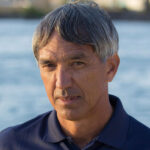
Charles Nainoa Thompson
Explorer, Pwo Navigator, cultural revivalist, educator, and storyteller Charles Nainoa Thompson is this year’s Honorary Geographer, an award given annually by the American Association of Geographers to recognize an exceptional leader in the arts, research, teaching, and writing whose work addresses geographic topics.
Thompson is being recognized for his ground-breaking efforts in reviving ancestral wayfinding practices and policy-shifting advocacy on behalf of the health of our planet. Inspired by the ancient art of wayfinding, Thompson learned to sail across the vast Pacific Ocean from Mau Piailug, a legendary master navigator from Satawal, and learned lessons on astronomy from Bishop Museum Planetarium Lecturer Will Kyselka.
In 1980, he embarked on his first journey as navigator from Hawaiʻi to Tahiti, guiding the Hōkūle‘a with only the stars, the winds, and the waves. Since then, he has led many more voyages of Hōkūleʻa, a traditional double-hulled canoe, to reconnect with the diverse cultures and lands of Polynesia.
He currently serves as CEO of the Polynesian Voyaging Society, where he continues to pass down knowledge to students of navigation and voyaging. Thompson is a former chair of the Board of Trustees for Kamehameha Schools and a former member of the Board of Regents for the University of Hawaiʻi. Thompson received his Honorary Doctorate from University of Hawai‘i in 2016. His natural leadership skills have galvanized vast and diverse sectors throughout the community to realize the importance of caring for our planet and all of humanity. These efforts have earned him numerous awards including the 2015 Peter Benchley Ocean Award for Excellence in Marine Exploration, the 2001 “Unsung Hero of Compassion” award from his Holiness XIV Dalai Lama on behalf of Wisdom in Action, the Native Hawaiian Education Association’s Manomano Kaʻike Educator of the Year, the 2015 Asia Pacific Community Building Award from the East-West Center, the 2013 Visionary Award from the Maui Film Festival, the 2016 Lifetime Achievement Award from the National Marine Sanctuaries Foundation, the 2017 Hubbard Medal from National Geographic Society, and the 2017 Explorers Club Medal.

2024 AAG Honorary Geographer
Charles Nainoa Thompson
2024 AAG Honorary Geographer
Explorer, Pwo Navigator, cultural revivalist, educator, and storyteller Charles Nainoa Thompson is this year’s Honorary Geographer, an award given annually by the American Association of Geographers to recognize an exceptional leader in the arts, research, teaching, and writing whose work addresses geographic topics.
Thompson is being recognized for his ground-breaking efforts in reviving ancestral wayfinding practices and policy-shifting advocacy on behalf of the health of our planet. Inspired by the ancient art of wayfinding, Thompson learned to sail across the vast Pacific Ocean from Mau Piailug, a legendary master navigator from Satawal, and learned lessons on astronomy from Bishop Museum Planetarium Lecturer Will Kyselka.
In 1980, he embarked on his first journey as navigator from Hawaiʻi to Tahiti, guiding the Hōkūle‘a with only the stars, the winds, and the waves. Since then, he has led many more voyages of Hōkūleʻa, a traditional double-hulled canoe, to reconnect with the diverse cultures and lands of Polynesia.
He currently serves as CEO of the Polynesian Voyaging Society, where he continues to pass down knowledge to students of navigation and voyaging. Thompson is a former chair of the Board of Trustees for Kamehameha Schools and a former member of the Board of Regents for the University of Hawaiʻi. Thompson received his Honorary Doctorate from University of Hawai‘i in 2016. His natural leadership skills have galvanized vast and diverse sectors throughout the community to realize the importance of caring for our planet and all of humanity. These efforts have earned him numerous awards including the 2015 Peter Benchley Ocean Award for Excellence in Marine Exploration, the 2001 “Unsung Hero of Compassion” award from his Holiness XIV Dalai Lama on behalf of Wisdom in Action, the Native Hawaiian Education Association’s Manomano Kaʻike Educator of the Year, the 2015 Asia Pacific Community Building Award from the East-West Center, the 2013 Visionary Award from the Maui Film Festival, the 2016 Lifetime Achievement Award from the National Marine Sanctuaries Foundation, the 2017 Hubbard Medal from National Geographic Society, and the 2017 Explorers Club Medal.
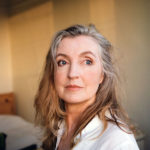
Rebecca Solnit
Rebecca Solnit, author and activist, is recognized for her consistent witness to shine light on possibilities for a better world, and her engagement in fighting for the planet’s future.

2023 AAG Honorary Geographer
Rebecca Solnit
2023 AAG Honorary Geographer
Rebecca Solnit, author and activist, is recognized for her consistent witness to shine light on possibilities for a better world, and her engagement in fighting for the planet’s future.
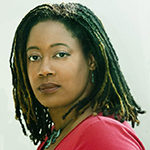
Nora K. Jemisin
Nora K. Jemisin, novelist, for her exceptionally insightful and thorough treatments of human-environment relationships, including the ways that power relations unfold and are resisted. Jemisin’s work demonstrates and advocates for a keen geographical understanding of the world and of human societies.

2022 AAG Honorary Geographer
Nora K. Jemisin
2022 AAG Honorary Geographer
Nora K. Jemisin, novelist, for her exceptionally insightful and thorough treatments of human-environment relationships, including the ways that power relations unfold and are resisted. Jemisin’s work demonstrates and advocates for a keen geographical understanding of the world and of human societies.
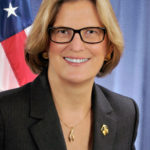
Kathryn Sullivan
Kathryn Sullivan, whose distinguished career includes being the first American woman to walk in space, serving as Under Secretary of Commerce for Oceans and Atmosphere, and NOAA Administrator. The direction in which Sullivan steered Administration and NOAA priority work in the areas of weather and water services, climate science, integrated mapping services and Earth-observing capabilities is immediately recognized and welcomed by geographers. That she also led NOAA with regard to satellites, space weather, water, and ocean observations and forecasts to best serve American communities and businesses resonates powerfully with the AAG. As a woman scientist and role model, Dr. Sullivan mirrors many of the values we also actively pursue in our discipline and our association.

2021 AAG Honorary Geographer
Kathryn Sullivan
2021 AAG Honorary Geographer
Kathryn Sullivan, whose distinguished career includes being the first American woman to walk in space, serving as Under Secretary of Commerce for Oceans and Atmosphere, and NOAA Administrator. The direction in which Sullivan steered Administration and NOAA priority work in the areas of weather and water services, climate science, integrated mapping services and Earth-observing capabilities is immediately recognized and welcomed by geographers. That she also led NOAA with regard to satellites, space weather, water, and ocean observations and forecasts to best serve American communities and businesses resonates powerfully with the AAG. As a woman scientist and role model, Dr. Sullivan mirrors many of the values we also actively pursue in our discipline and our association.
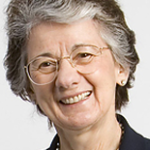
Rita Colwell
Rita Colwell, University of Maryland College Park, for her distinguished career as the 11th Director of the National Science Foundation, her many important leadership roles in academia, and her many significant advisory positions in the U.S. Government, nonprofit science policy organizations, and private foundations, and in the international scientific research community.

2019 AAG Honorary Geographer
Rita Colwell
2019 AAG Honorary Geographer
Rita Colwell, University of Maryland College Park, for her distinguished career as the 11th Director of the National Science Foundation, her many important leadership roles in academia, and her many significant advisory positions in the U.S. Government, nonprofit science policy organizations, and private foundations, and in the international scientific research community.
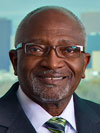
Robert Bullard
| Robert Bullard, Texas Southern University, for the important foundational role that he has played in the study of environmental and transportation justice and the skills he has shown in translating those ideas to policy makers and wider public groups. |

2018 AAG Honorary Geographer
Robert Bullard
2018 AAG Honorary Geographer
| Robert Bullard, Texas Southern University, for the important foundational role that he has played in the study of environmental and transportation justice and the skills he has shown in translating those ideas to policy makers and wider public groups. |

James E. Hansen
James E. Hansen for his leadership and engagement in anthropogenic changes of the atmospheric composition, and for spreading broad awareness of global warming through his Congressional testimony on climate change and by disseminating NASA visualizations of our planet and its changing climate.

2017 AAG Honorary Geographer
James E. Hansen
2017 AAG Honorary Geographer
James E. Hansen for his leadership and engagement in anthropogenic changes of the atmospheric composition, and for spreading broad awareness of global warming through his Congressional testimony on climate change and by disseminating NASA visualizations of our planet and its changing climate.
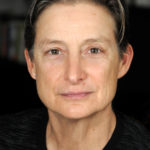
Judith Butler
| Judith Butler for her foundational contributions to feminist and queer theory, cultural studies, and feminist and moral philosophy, which have transformed the ways in which scholars have understood gender and sexual identities. |

2016 AAG Honorary Geographer
Judith Butler
2016 AAG Honorary Geographer
| Judith Butler for her foundational contributions to feminist and queer theory, cultural studies, and feminist and moral philosophy, which have transformed the ways in which scholars have understood gender and sexual identities. |
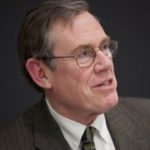
Peter K. Bol
| Peter K. Bol for his leadership role and engagement with the AAG to build university-wide support at Harvard University for geospatial analysis in teaching and research. |

2015 AAG Honorary Geographer
Peter K. Bol
2015 AAG Honorary Geographer
| Peter K. Bol for his leadership role and engagement with the AAG to build university-wide support at Harvard University for geospatial analysis in teaching and research. |

Warren Washington
Warren Washington for his contributions as a pioneer in the development of coupled climate models and in recognition of him as a leading scientist in the area of climate variability and change.

2014 AAG Honorary Geographer
Warren Washington
2014 AAG Honorary Geographer
Warren Washington for his contributions as a pioneer in the development of coupled climate models and in recognition of him as a leading scientist in the area of climate variability and change.

Maya Lin
Maya Lin for her impact on the way we look at the world and how we relate to it. AAG is impressed with the influence of her monuments on the world of architecture, and also for the way in which her vision integrates monuments into landscapes in new and dramatic ways.

2013 AAG Honorary Geographer
Maya Lin
2013 AAG Honorary Geographer
Maya Lin for her impact on the way we look at the world and how we relate to it. AAG is impressed with the influence of her monuments on the world of architecture, and also for the way in which her vision integrates monuments into landscapes in new and dramatic ways.
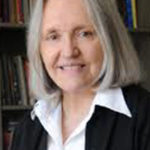
Saskia Sassen
Saskia Sassen for her far-reaching impact on the study of globalization and its influence on labor mobiity, global cities, and new technologies, spurring scholars and decision-makers to consider innovative responses to the challenge of sustainable development.

2012 AAG Honorary Geographer
Saskia Sassen
2012 AAG Honorary Geographer
Saskia Sassen for her far-reaching impact on the study of globalization and its influence on labor mobiity, global cities, and new technologies, spurring scholars and decision-makers to consider innovative responses to the challenge of sustainable development.
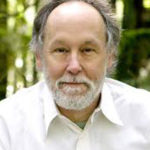
Barry Lopez
| Barry Lopez for his evocative portrayals of people living in close communication with nature, and for his exemplary works of fiction and nonfiction alike that honor and inspire ideas about geography and landscape. |

2011 AAG Honorary Geographer
Barry Lopez
2011 AAG Honorary Geographer
| Barry Lopez for his evocative portrayals of people living in close communication with nature, and for his exemplary works of fiction and nonfiction alike that honor and inspire ideas about geography and landscape. |
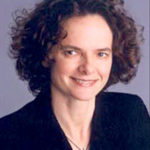
Nora Volkow
Nora Volkow for her groundbreaking and innovative work on drug addiction, demonstrating a geographic perspective and attention to geographical context, and for her significant influence on geography research and research agendas in the health sciences.

2010 AAG Honorary Geographer
Nora Volkow
2010 AAG Honorary Geographer
Nora Volkow for her groundbreaking and innovative work on drug addiction, demonstrating a geographic perspective and attention to geographical context, and for her significant influence on geography research and research agendas in the health sciences.
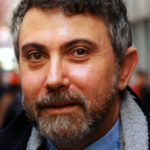
Paul Krugman
Paul Krugman 2008 Nobel Laureate in Economics, for his deep and abiding appreciation of a geographic perspective in economics, for his contributions to economic geography, for his exemplary writings that draw from and are inspired by geographic scholarship, and for bringing to bear geographic approaches to international trade theory and strategic trade policy.

2009 AAG Honorary Geographer
Paul Krugman
2009 AAG Honorary Geographer
Paul Krugman 2008 Nobel Laureate in Economics, for his deep and abiding appreciation of a geographic perspective in economics, for his contributions to economic geography, for his exemplary writings that draw from and are inspired by geographic scholarship, and for bringing to bear geographic approaches to international trade theory and strategic trade policy.

Charles Mann
Charles Mann for his deep and abiding appreciation of a geographic perspective through his exemplary writings that draw from and are inspired by geographic scholarship.

2008 AAG Honorary Geographer
Charles Mann
2008 AAG Honorary Geographer
Charles Mann for his deep and abiding appreciation of a geographic perspective through his exemplary writings that draw from and are inspired by geographic scholarship.
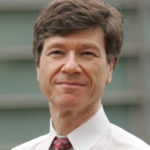
Jeffrey Sachs
Jeffrey Sachs for his deep and abiding appreication of a geographic perspective and through his exemplary global leadership in confronting the challenges of economic development, poverty alleviation, globalization, and enivronmental sustainability

2007 AAG Honorary Geographer
Jeffrey Sachs
2007 AAG Honorary Geographer
Jeffrey Sachs for his deep and abiding appreication of a geographic perspective and through his exemplary global leadership in confronting the challenges of economic development, poverty alleviation, globalization, and enivronmental sustainability
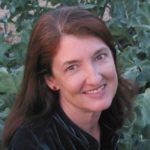
Barbara Kingsolver
Barbara Kingsolver for her deep and abiding appreciation of the importance of place, culture, and the environment in her creative and inspiring writings.

2006 AAG Honorary Geographer
Barbara Kingsolver
2006 AAG Honorary Geographer
Barbara Kingsolver for her deep and abiding appreciation of the importance of place, culture, and the environment in her creative and inspiring writings.
Stephen Pyne
Stephen Pyne for his pioneering and geographically-informed scholarship in the cultural ecology of fire and forest management
2005 AAG Honorary Geographer
Stephen Pyne
2005 AAG Honorary Geographer
Stephen Pyne for his pioneering and geographically-informed scholarship in the cultural ecology of fire and forest management
J. Keith Ord
J. Keith Ord for his pioneering work in spatial autocorrelation, in the spatial diffusion of disease, and in the creation of spatially local statistics, and for his collaborations with prominent geographers and co-authorship of prominent texts of major importance to the discipline of geography.
2004 AAG Honorary Geographer
J. Keith Ord
2004 AAG Honorary Geographer
J. Keith Ord for his pioneering work in spatial autocorrelation, in the spatial diffusion of disease, and in the creation of spatially local statistics, and for his collaborations with prominent geographers and co-authorship of prominent texts of major importance to the discipline of geography.
Cynthia Enloe
Cynthia Enloe for her deep and abiding appreciation of geographic perspectives in her analyses of state practices and international politics and for her profound influence on feminist and political geography.
2003 AAG Honorary Geographer
Cynthia Enloe
2003 AAG Honorary Geographer
Cynthia Enloe for her deep and abiding appreciation of geographic perspectives in her analyses of state practices and international politics and for her profound influence on feminist and political geography.
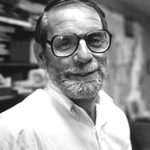
John McPhee
John McPhee for his appreciation of the importance of places in fostering understanding of the earth and its natural environments, and for his sensitive exposition of the uses people have made of those places.

2002 AAG Honorary Geographer
John McPhee
2002 AAG Honorary Geographer
John McPhee for his appreciation of the importance of places in fostering understanding of the earth and its natural environments, and for his sensitive exposition of the uses people have made of those places.
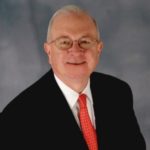
John E. Gould
John E. Gould for dedicated and effective leadership of the American Geographical Society and for his vigorous efforts to foster appreciation for geography in the wider community.

2001 AAG Honorary Geographer
John E. Gould
2001 AAG Honorary Geographer
John E. Gould for dedicated and effective leadership of the American Geographical Society and for his vigorous efforts to foster appreciation for geography in the wider community.
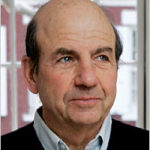
Calvin Trillin
Calvin Trillin for humorous writing that is sensitive to localities and cultural environments as exemplified in Travels with Alice and other works.

2000 AAG Honorary Geographer
Calvin Trillin
2000 AAG Honorary Geographer
Calvin Trillin for humorous writing that is sensitive to localities and cultural environments as exemplified in Travels with Alice and other works.
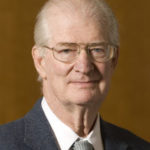
Herman E. Daly
Herman E. Daly for the freshness of insight and depth of critical thought he has brought to research and teaching in economics, ecology, and resource use.

1999 AAG Honorary Geographer
Herman E. Daly
1999 AAG Honorary Geographer
Herman E. Daly for the freshness of insight and depth of critical thought he has brought to research and teaching in economics, ecology, and resource use.
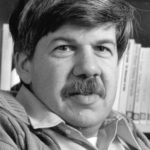
Stephen Jay Gould
Stephen Jay Gould in recognition of the sensitivity to location, place, and geographical relationships evident in his penetrating and perceptive writing for scientists and the public.

1998 AAG Honorary Geographer
Stephen Jay Gould
1998 AAG Honorary Geographer
Stephen Jay Gould in recognition of the sensitivity to location, place, and geographical relationships evident in his penetrating and perceptive writing for scientists and the public.

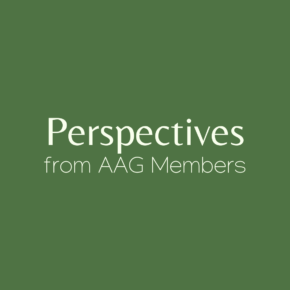
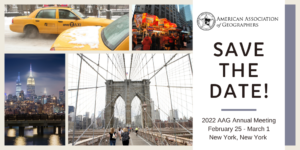 Mark your calendar for the AAG Annual Meeting in the Big Apple, February 25 – March 1, 2022. The hybrid meeting will take place both online and at the NY Hilton Midtown and the Sheraton New York Times Square Hotel. Registration and the call for papers for #AAG2022 will be announced this summer, and we invite you to organize and participate in sessions, workshops, field trips, special events, and activities. We look forward to seeing you in New York City!
Mark your calendar for the AAG Annual Meeting in the Big Apple, February 25 – March 1, 2022. The hybrid meeting will take place both online and at the NY Hilton Midtown and the Sheraton New York Times Square Hotel. Registration and the call for papers for #AAG2022 will be announced this summer, and we invite you to organize and participate in sessions, workshops, field trips, special events, and activities. We look forward to seeing you in New York City!
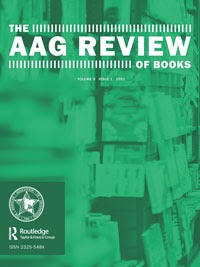
 In addition to the most recently published journal, read the latest issue of the other AAG journals online:
In addition to the most recently published journal, read the latest issue of the other AAG journals online: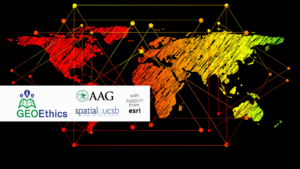 The American Association of Geographers, in partnership with the Center for Spatial Studies at the University of California Santa Barbara and with support from Esri, has launched a series of webinars on key considerations for GeoEthics. The next webinar is a half-day symposium,
The American Association of Geographers, in partnership with the Center for Spatial Studies at the University of California Santa Barbara and with support from Esri, has launched a series of webinars on key considerations for GeoEthics. The next webinar is a half-day symposium, 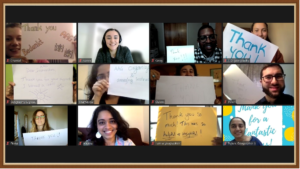
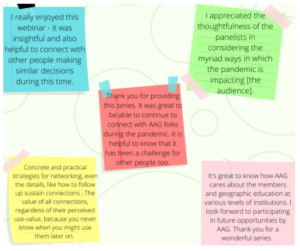
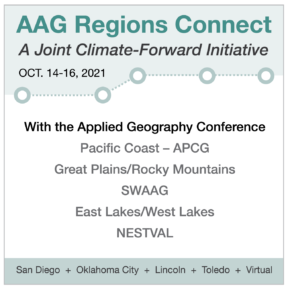 This fall will be a great time to reconnect with colleagues, both in your regions and beyond. For the first time, AAG and the Applied Geography Conference are collaborating with six of our Regional Divisions to create a carbon-sensitive meeting model with
This fall will be a great time to reconnect with colleagues, both in your regions and beyond. For the first time, AAG and the Applied Geography Conference are collaborating with six of our Regional Divisions to create a carbon-sensitive meeting model with 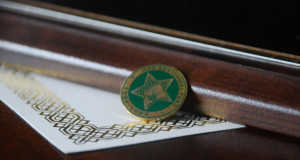

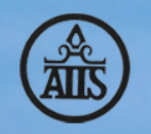 The American Institute of Indian Studies announces its 2021 fellowship competition and invites applications from scholars who wish to conduct their research in India. Junior fellowships are awarded to Ph.D. candidates to conduct research for their dissertations in India for up to eleven months. Senior fellowships are awarded to scholars who hold the Ph.D. degree for up to nine months of research in India. The application deadline is November 15, 2021. The application can be accessed from the web site
The American Institute of Indian Studies announces its 2021 fellowship competition and invites applications from scholars who wish to conduct their research in India. Junior fellowships are awarded to Ph.D. candidates to conduct research for their dissertations in India for up to eleven months. Senior fellowships are awarded to scholars who hold the Ph.D. degree for up to nine months of research in India. The application deadline is November 15, 2021. The application can be accessed from the web site 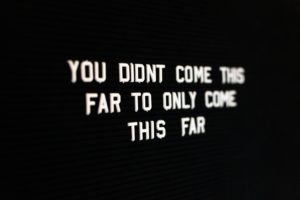 With summer almost here, I’m about to head into my last year as an academic. I’m “retiring” June 2022, although in truth I’ll work full time running my family’s winery and nonprofit, both built around the mission of providing training, jobs, and community for those with disabilities. As I transition from academics, Andrew and I are encountering many things we didn’t know were part of running a small business. This transition has prompted me to reflect on my transition from student to faculty member and, in turn, on how we prepare our graduate students for major life and career transitions.
With summer almost here, I’m about to head into my last year as an academic. I’m “retiring” June 2022, although in truth I’ll work full time running my family’s winery and nonprofit, both built around the mission of providing training, jobs, and community for those with disabilities. As I transition from academics, Andrew and I are encountering many things we didn’t know were part of running a small business. This transition has prompted me to reflect on my transition from student to faculty member and, in turn, on how we prepare our graduate students for major life and career transitions.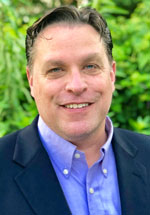 In May, we introduced a new column to the AAG Newsletter called Perspectives, replacing AAG’s former Op-Ed feature. Perspectives will share the opinions and ideas of members on issues of relevance to geography. We encourage submissions that stimulate dialogue, get members thinking, and challenge our discipline to take new approaches to the social, political, and environmental issues confronting geographers and the public.
In May, we introduced a new column to the AAG Newsletter called Perspectives, replacing AAG’s former Op-Ed feature. Perspectives will share the opinions and ideas of members on issues of relevance to geography. We encourage submissions that stimulate dialogue, get members thinking, and challenge our discipline to take new approaches to the social, political, and environmental issues confronting geographers and the public.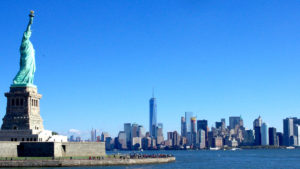

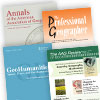 In addition to the most recently published journal, read the latest issue of the other AAG journals online:
In addition to the most recently published journal, read the latest issue of the other AAG journals online: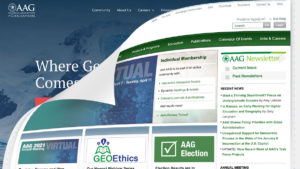 During our virtual annual meeting, we gave a sneak peek of our new website currently in the design process. If you missed the session or weren’t able to attend the conference, you still have a chance to see the recording. Our website agency, Free Range, revealed some of the exciting changes in store for this completely accessible, innovative, and mobile friendly website launching later this spring. Please send us your questions and thoughts at
During our virtual annual meeting, we gave a sneak peek of our new website currently in the design process. If you missed the session or weren’t able to attend the conference, you still have a chance to see the recording. Our website agency, Free Range, revealed some of the exciting changes in store for this completely accessible, innovative, and mobile friendly website launching later this spring. Please send us your questions and thoughts at 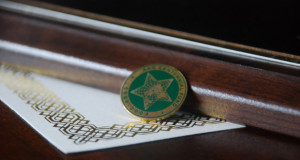 Please consider nominating outstanding colleagues for the AAG Honors, the highest awards offered by the American Association of Geographers. Individual AAG members, specialty groups, affinity groups, departments, and other interested parties are encouraged to nominate outstanding colleagues. Deadlines for nominations will be later this year – on September 15th. The new nomination portal will be open for nominations starting later this summer.
Please consider nominating outstanding colleagues for the AAG Honors, the highest awards offered by the American Association of Geographers. Individual AAG members, specialty groups, affinity groups, departments, and other interested parties are encouraged to nominate outstanding colleagues. Deadlines for nominations will be later this year – on September 15th. The new nomination portal will be open for nominations starting later this summer.
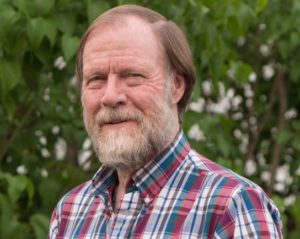
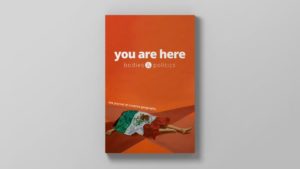 The 2021 issue of you are here: bodies & politics has been published. This issue focuses on the significance and political potentials of bodies and embodiment in the current political moment. you are here is an annual publication produced by graduate students at the University of Arizona School of Geography, Development, and Environment. The journal seeks to explore geographic themes through poetry, creative writing, maps, photographs, visual art, sonic art, film, and other imaginable genres.
The 2021 issue of you are here: bodies & politics has been published. This issue focuses on the significance and political potentials of bodies and embodiment in the current political moment. you are here is an annual publication produced by graduate students at the University of Arizona School of Geography, Development, and Environment. The journal seeks to explore geographic themes through poetry, creative writing, maps, photographs, visual art, sonic art, film, and other imaginable genres.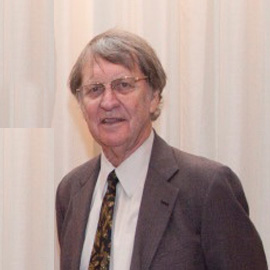 Roger Kasperson passed away in his home in Washington, D.C. on Saturday, April 10, 2021. A former Clark Graduate School of Geography faculty member, Kasperson also received his B.A. in geography from Clark and his M.A. and PhD from University of Chicago. Kasperson was a major figure in risk analysis, resilience, and sustainability and was an elected member of the National Academy of Sciences, the American Academy of Arts and Sciences, and the American Association for the Advancement of Science.
Roger Kasperson passed away in his home in Washington, D.C. on Saturday, April 10, 2021. A former Clark Graduate School of Geography faculty member, Kasperson also received his B.A. in geography from Clark and his M.A. and PhD from University of Chicago. Kasperson was a major figure in risk analysis, resilience, and sustainability and was an elected member of the National Academy of Sciences, the American Academy of Arts and Sciences, and the American Association for the Advancement of Science. 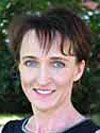 “You Baby.” It’s Saturday morning. Jeffrey, who is chronologically well out of his early teenage years, but very much still there in spirit, is awake and calling to me with his favorite insult. He’s mostly non-verbal, but this particular phrase is one that he articulates well enough for anyone to understand.
“You Baby.” It’s Saturday morning. Jeffrey, who is chronologically well out of his early teenage years, but very much still there in spirit, is awake and calling to me with his favorite insult. He’s mostly non-verbal, but this particular phrase is one that he articulates well enough for anyone to understand.